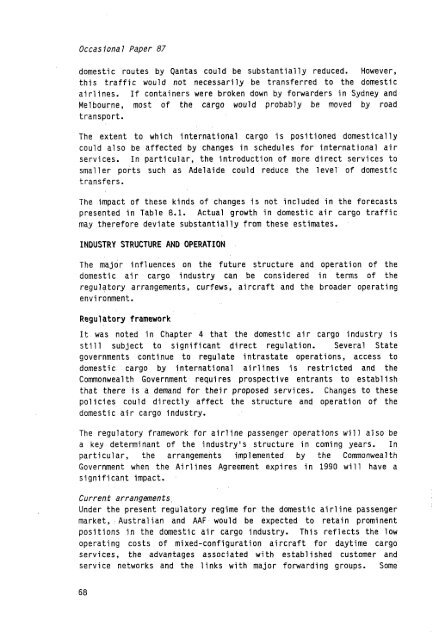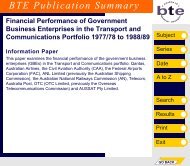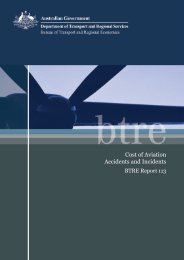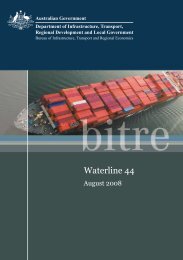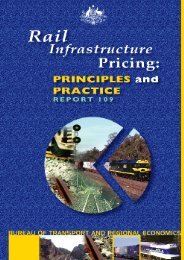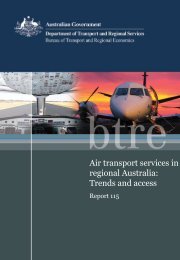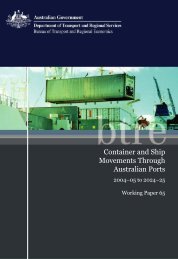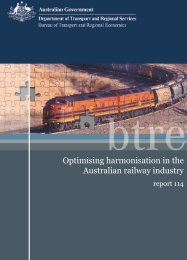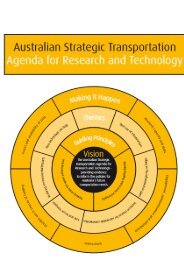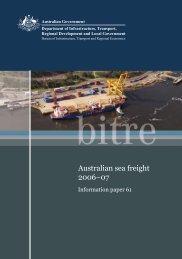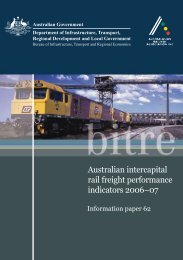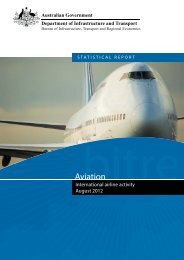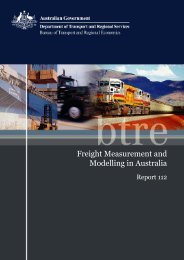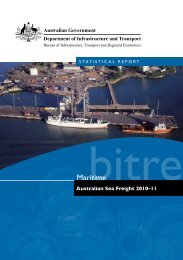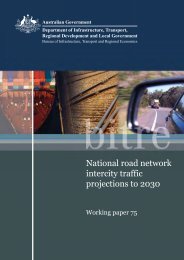Domestic Air Cargo Industry in Australia - Bureau of Infrastructure ...
Domestic Air Cargo Industry in Australia - Bureau of Infrastructure ...
Domestic Air Cargo Industry in Australia - Bureau of Infrastructure ...
Create successful ePaper yourself
Turn your PDF publications into a flip-book with our unique Google optimized e-Paper software.
Occasional Paper 87domestic routes by Qantas could be substantially reduced. However,this traffic would not necessarily be transferred to the domesticairl<strong>in</strong>es. If conta<strong>in</strong>ers were broken down by forwarders <strong>in</strong> Sydney andMelbourne, most <strong>of</strong> the cargo would probably be moved by roadtransport.The extent to which <strong>in</strong>ternational cargo is positioned domesticallycould also be affected by changes <strong>in</strong> schedules for <strong>in</strong>ternational airservices. In particular, the <strong>in</strong>troduction <strong>of</strong> more direct services tosmaller ports such as Adelaide could reduce the level <strong>of</strong> domestictransfers.The impact <strong>of</strong> these k<strong>in</strong>ds <strong>of</strong> changes is not <strong>in</strong>cluded <strong>in</strong> the forecastspresented <strong>in</strong> Table 8.1. Actual growth <strong>in</strong> domestic air cargo trafficmay therefore deviate substantially from these estimates.INDUSTRY STRUCTURE AND OPERATIONThe major <strong>in</strong>fluences on the future structure and operation <strong>of</strong> thedomestic air cargo <strong>in</strong>dustry can be considered <strong>in</strong> terms <strong>of</strong> theregulatory arrangements, curfews, aircraft and the broader operat<strong>in</strong>genvironment.Regulatory frameworkIt was noted <strong>in</strong> Chapter 4 that the domestic air cargo <strong>in</strong>dustry isstill subject to significant direct regulation. Several Stategovernments cont<strong>in</strong>ue to regulate <strong>in</strong>trastate operations, access todomestic cargo by <strong>in</strong>ternational airl<strong>in</strong>es is restricted and theCommonwealth Government requires prospective entrants to establishthat there is a demand for their proposed services. Changes to thesepolicies could directly affect the structure and operation <strong>of</strong> thedomestic air cargo <strong>in</strong>dustry.The regulatory framework for airl<strong>in</strong>e passenger operations will also bea key determ<strong>in</strong>ant <strong>of</strong> the <strong>in</strong>dustry's structure <strong>in</strong> com<strong>in</strong>g years.Inparticular, the arrangements implemented by the ComonwealthGovernment when the <strong>Air</strong>l<strong>in</strong>es Agreement expires<strong>in</strong> 1990 will have asignificant impact.Current arrangementsUnder the present regulatory regime for the domestic airl<strong>in</strong>e passengermarket, <strong>Australia</strong>n and AAF would be expected to reta<strong>in</strong> prom<strong>in</strong>entpositions <strong>in</strong> the domestic air cargo <strong>in</strong>dustry. This reflects the lowoperat<strong>in</strong>g costs <strong>of</strong> mixed-configuration aircraft for daytime cargoservices, the advantages associated with established customer andservice networks and the l<strong>in</strong>ks with major forward<strong>in</strong>g groups. Some68


